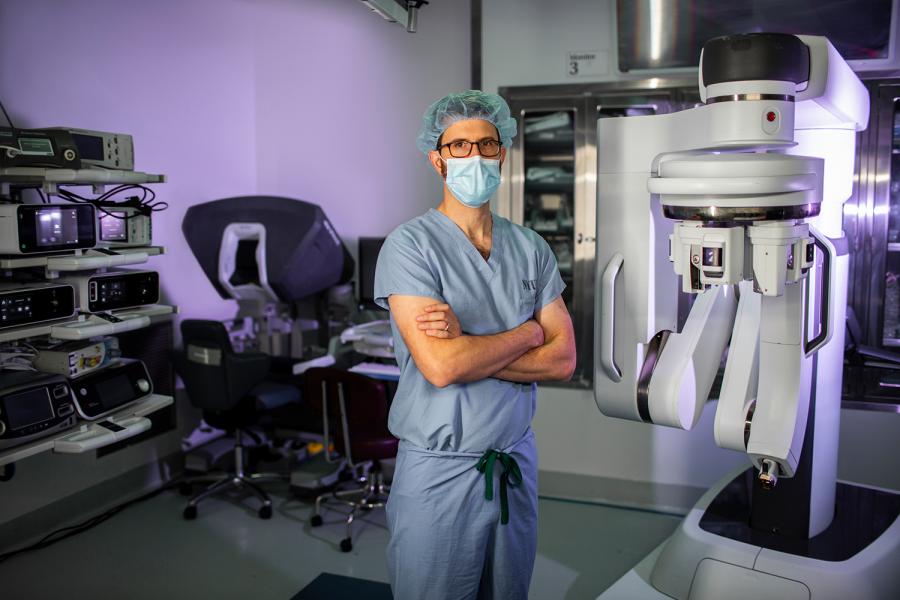
Division of Head & Neck Surgery
The Division of Head and Neck Surgery is part of NYU Langone Health’s Department of Otolaryngology—Head and Neck Surgery. We provide comprehensive training for surgeons who wish to specialize in treating benign and malignant neoplasms of the head and neck, including cancers of the aerodigestive tract, thyroid, salivary gland and paranasal sinuses; thyroid and parathyroid abnormalities; hemangiomas; vascular malformations; advanced regional cutaneous carcinomas and melanomas; and inflammatory processes and trauma of the head and neck. Surgeons also receive training in treating a wide variety of upper aerodigestive tract abnormalities.
As a medical student, resident, or fellow, you learn innovative three-dimensional planning techniques and surgical procedures, including minimally invasive and robotic techniques, to maximize patient function and physical appearance. You receive training from leaders in the field, including head and neck surgeons, reconstructive plastic surgeons, oral and maxillofacial surgeons, radiologists, and pathologists.
You also work with radiation and medical oncologists to develop treatment plans for patients with malignant tumors of the head and neck that focus on managing the condition as well as preserving optimal postoperative function.
Our faculty members lead prestigious professional societies, participate in investigative trials to develop and evaluate new tumor treatment protocols, actively engage in clinical research, and publish and review submissions in the top peer-reviewed medical journals.
Head and Neck Surgery Education
The Division of Head and Neck Surgery provides comprehensive training to evaluate and treat patients with a broad range of benign and malignant head and neck, thyroid, and upper aerodigestive tract tumors, abnormalities, and trauma in a high-volume setting.
Medical students, residents, fellows, and professionals learn to formulate personalized, targeted treatments using advanced surgical and reconstructive techniques. These include the use of three-dimensional technology, minimally invasive and robotic surgical procedures, virtual surgical planning sessions, and the development of patient-specific custom implants.
Medical students interested in specializing in otolaryngology and head and neck surgery complete rotations in the Division of Head and Neck Surgery as part of electives in NYU Grossman School of Medicine’s Curriculum for the 21st Century.
During Otolaryngology—Head and Neck Surgery residency training and fellowship training, our house staff gains hands-on experience in performing evidence-based surgical techniques and disease management approaches. Weekly multidisciplinary head and neck tumor conferences give residents and fellows opportunities to work with radiation oncologists, medical oncologists, plastic surgeons, oral and maxillofacial surgeons, radiologists, surgical pathologists, and speech and swallowing therapists as they develop patient treatment plans. Trainees also attend Department of Otolaryngology—Head & Neck Surgery lectures.
Fellows in our one-year Head and Neck Oncology—Reconstructive Surgery fellowship gain intensive subspecialty training in the pathology of head and neck neoplasms, surgical approaches to these neoplasms including minimally invasive approaches and transoral robotic surgery, and a wide variety of reconstructive techniques. They are also trained in the treatment-related complications of wound healing.
Our Vascular Anomalies Conference for otolaryngologists, plastic surgeons, dermatologists, and vascular radiologists is held every three weeks and focuses on the multidisciplinary evaluation of patients with congenital and acquired complicated vascular lesions, including hemangiomas. The meeting is co-led by our faculty along with Francine Blei, MD, a pediatric medical oncologist who specializes in vascular anomalies.
Head and Neck Surgery Research
Investigators in the Division of Head and Neck Surgery collaborate with the Head and Neck Cancer Disease Management Group at NYU Langone’s Perlmutter Cancer Center on clinical research to improve outcomes for patients with head and neck cancer. This research in cancer genetics, immunology, and biomolecular markers explores the following topics:
- integrating immunotherapy, chemotherapy, radiation therapy, and surgery to treat head and neck cancer
- identifying predictive biomarkers for head and neck cancer
- preventing head and neck cancer recurrence after treatment
- treatment protocols involving deintensification of chemotherapy and radiation therapy to improve quality-of-life outcomes by addressing the long-term effects of treatment
Medical students, residents, fellows, and surgeons have opportunities to conduct research in these areas alongside faculty. Learn more about research in the Department of Otolaryngology—Head & Neck Surgery.
Head and Neck Surgery Clinical Services
Our surgeons are experts in head and neck surgery as well as reconstructive and plastic surgery. We assess both function and appearance to achieve the best chance for cure and optimal quality-of-life outcomes. We also offer genetic testing, advanced imaging techniques, and support services that include speech and swallowing rehabilitation and occupational and physical therapy, both during and after treatment.
We maintain a busy clinical and surgical presence at NYU Langone’s Head and Neck Center at Perlmutter Cancer Center, Tisch Hospital, Kimmel Pavilion, NYU Langone Hospital—Brooklyn, NYU Langone Hospital—Long Island, NYC Health + Hospitals/Bellevue, and the VA NY Harbor Healthcare System. At these locations, we perform both ablative and reconstructive surgery for head and neck cancer, including the use of regional flaps, pedicled myocutaneous flaps, and microvascular free-flap techniques.
We also collaborate with the Department of Radiology for advanced head and neck imaging studies and interventional radiologic procedures, including image-directed biopsies and embolization and sclerosing treatment of vascular lesions. With the assistance of the Department of Surgery, we treat tumors that extend into the thoracic inlet. We partner with the Department of Neurosurgery for treating acoustic neuroma, neurofibromas, pituitary tumors, and other complicated skull base pathologies and we regularly work with the Departments of Neurosurgery and Orthopedic Surgery on surgery to the cervical spine and craniocervical junction.
Our Comprehensive Neurofibromatosis Center is one of the most active in the country for treating neurofibromatosis type 2. Collaboration between the Departments of Otolaryngology—Head and Neck Surgery and Neurosurgery has resulted in major advances in the treatment of this complicated disease.
We use the most innovative surgical approaches to treat head and neck cancers, many of which are performed at our Robotic Surgery Center. In addition, we specialize in radiation therapy techniques, and chemotherapy and targeted medications, including immunotherapy, as alternatives to surgery.
If extensive surgery is necessary, our reconstructive team is among the world’s most experienced and uses advanced techniques, including three-dimensional modeling and virtual surgical planning.

